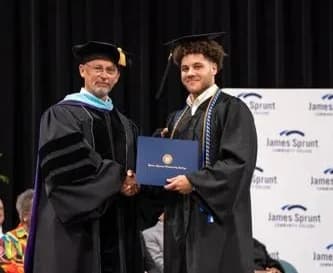

Resources for Parents
What you need to know—and the people you can speak with—to help your student achieve their goals in the North Carolina Community College System.
What to Expect When Your Child Goes To College
To succeed in college, students should be prepared not only to attend classes, but to set aside time to study when they are not in class. Progress toward a degree or certification is measured in credit hours earned when each course is completed with a passing grade. If a student is having difficulty with a course, they can receive guidance and assistance by making an appointment with their instructor during the instructor's office hours.
Family Educational Rights and Privacy Act (FERPA)
We encourage parents to stay engaged with their students throughout their college career. However, please know that we cannot release any information about any student who is over the age of 18 without a signed FERPA form from that student.
Learn about FERPA forms and requirements
Paying for College
North Carolina community colleges can be the most affordable way to advance your student’s education and career. Plus, we can help you find the funding to pay their way.
Find the Right Path from High School to College
Use our Career and College Promise (CCP) program to earn credits that can transfer to a four-year school while you’re still in high school or after you’ve graduated. To find out if this is the right program for your high school student, talk with your local high school career coach.
Career Assessment
If you’re not sure which career path is right for you, visit NCcareers.org to find the ones that best fit who you are and how you want to live.
Prepare for Your Career
Our more than 200 certificate and diploma programs provide the knowledge and credentials your student needs to excel in North Carolina’s most popular and high-paying careers.
University Transfer
Find out how your student can transfer credit from your community college to a four-year institution through our articulation agreements across the state.
Disability Services
We work with all campus community members to provide access and eliminate barriers to physical, curricular, and web environments within the NC Community College System.

Young Entrepreneur Makes the Most of His Time
Launching two businesses, 17 year old James Yacoubian learned that “the quality of how I use my time… can help me live my life more freely.”
That understanding led him to choose the Career and College Promise program at Guilford Technical Community College, because it allows him to grow his businesses, finish high school, and get a head start on college—all at the same time. “It’s made for effort and initiative,” James says—and it can pay big bonuses for that effort and initiative.

Finding the Right Balance
Malaika Siddique is passionate about serving others. She has founded a non-profit, tutored elementary students, written seasonal cards to veterans, and donated blood.
She knows, though, that continuing to make the positive impact she wants to make requires a good education. “I want to go into the medical field because I want to dedicate my life to help make other lives better,” she says. Through the Career and College Promise program at GTCC, she is not only earning an accounting certificate, associate degree, and transferable college credit, she is also receiving important support for the next stage of her education, noting, “Some of my professors went out of the way to write me recommendation letters.”

From Community College to Harvard–On Scholarship
According to James Kenan High School principal Michael Holton, none of the school’s students have ever received more scholarships or college acceptances than Elijah Bostic. Bostic chose Harvard, and will be attending college debt-free as a Gates Scholar recipient.
Bostic credits his success to the Career and College Promise (CCP) program at Duplin County’s James Sprunt Community College. The CCP program helped him “achieve my educational goals… set me apart from my classmates… and helped me reach my full educational potential,” he says. “It gives you the upper hand when it’s time to graduate and saves you thousands of dollars.”
About Those Abbreviations
The community college system, like most large organizations, abbreviates often-used phrases into acronyms, usually made up of the first letter of each word in the phrase. This makes life easier for the people who use these phrases all the time, but can be confusing for people who don’t. Whenever you run across an acronym you don’t know, use this alphabetical list to find out what it stands for.
- AA- Associate of Arts
- AS- Associate of Science
- AAS- Associate of Applied Science
- ABE- Adult Basic Education
- AE- Associate of Engineering
- AFA- Associate of Fine Arts
- AATP- Associate in Arts in Teacher Preparation
- ASTP- Associate in Science in Teacher Preparation
- ADN- Associate Degree in Nursing
- ADA- Americans with Disabilities Act
- BDPs- Baccalaureate Degree Plans
- CAA- Comprehensive Articulation Agreement
- CCP- Career and College Promise
- CTE- Career and Technical Education
- CIHS- Cooperative and Innovative High School
- CCR- Career and College Ready
- CCRG- College and Career ready graduates
- ESL- English as Second Language
- FAFSA- Free Application for Federal Student Aid
- FERPA- Family Educational Rights to Privacy Act
- ICAA- Independent Comprehensive Articulation Agreement
- LEA- Local Education Agency Selective Admissions
- LMS- Learning management system (Blackboard, Moodle,Canvas)
- NCCCS- North Carolina Community College System, the system that governs the 58 community colleges
- NCICU- The system that governs the 36 private colleges
- NJCAA- National Junior College Athletic Association
- RDS- Residency Determination Services
- RISE- Reinforced Instruction for Student Excellence
- RN - BSN- Registered Nurse to Bachelors of Science in Nursing
- SAP- Satisfactory Academic Progress (2.0 GPA / Completing 66% of courses)
- TAC- Transfer Advisory Committee
- UGETC- Universal General Education Transfer Component
- UNC- System The system that governs the 17 UNC System institutions
- WIOA- Workforce Innovation Opportunity Act
Terms You’ll Want to Know
In addition to acronyms, NC community colleges use a number of terms that are specific to the college experience. Use this quick guide to find out what these terms mean.
- PreRequisite- A course that must be completed prior to enrolling in an advanced course
- Corequisite- Being able to take a developmental & credit bearing course in the same semester
- Full time- Students taking 12+ hours
- Part Time- Student taking less than 12 hours
- Centralized Advising- An advising model where professional advisors are housed in a single academic unit.
- Decentralized Advising- An advising model where professional or faculty advisors are located in their respective academic departments.
- ConEd- Continuing Education
- Curriculum- Traditional certificate, diploma, degree seeking students
- No Degree- 30+ No Degree less than 30 hours
- Longleaf Commitment- A grant program for 2022 North Carolina high school graduates who will attend one of our state’s “Great 58” community colleges starting in the Fall 2022 semester. High school students may be eligible to receive this grant – not a loan – for tuition and fees toward a degree or to attain transfer credit. Full-time eligible students are guaranteed to receive $700 to $2,800 per year, for a total of two years. Less than full-time students may receive a partial award. The Longleaf Commitment Grant Program ends at the conclusion of the 2024 spring semester.
Positions You May Interact With
At your community college, you will find staff members who are dedicated to helping students achieve their educational goals. We encourage all students to use these resources to get the assistance they need.
Success Coach
Career Coach
MMSI Coach
Staff Advisor (professional)
Faculty Advisor
Digital literacy coach